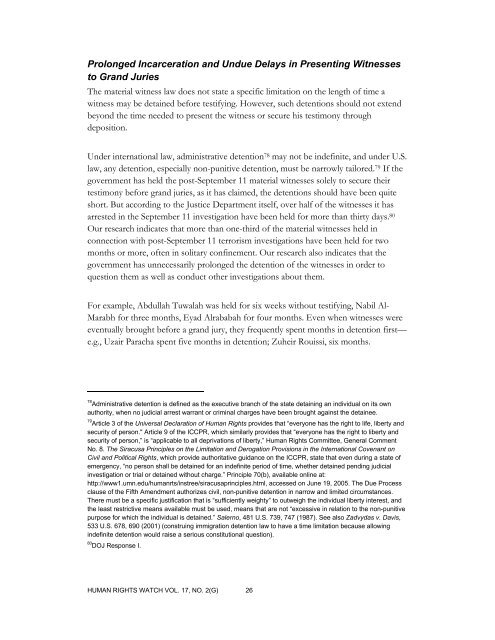Witness to Abuse - Human Rights Watch
Witness to Abuse - Human Rights Watch
Witness to Abuse - Human Rights Watch
Create successful ePaper yourself
Turn your PDF publications into a flip-book with our unique Google optimized e-Paper software.
Prolonged Incarceration and Undue Delays in Presenting <strong>Witness</strong>es<br />
<strong>to</strong> Grand Juries<br />
The material witness law does not state a specific limitation on the length of time a<br />
witness may be detained before testifying. However, such detentions should not extend<br />
beyond the time needed <strong>to</strong> present the witness or secure his testimony through<br />
deposition.<br />
Under international law, administrative detention 78 may not be indefinite, and under U.S.<br />
law, any detention, especially non-punitive detention, must be narrowly tailored. 79 If the<br />
government has held the post-September 11 material witnesses solely <strong>to</strong> secure their<br />
testimony before grand juries, as it has claimed, the detentions should have been quite<br />
short. But according <strong>to</strong> the Justice Department itself, over half of the witnesses it has<br />
arrested in the September 11 investigation have been held for more than thirty days. 80<br />
Our research indicates that more than one-third of the material witnesses held in<br />
connection with post-September 11 terrorism investigations have been held for two<br />
months or more, often in solitary confinement. Our research also indicates that the<br />
government has unnecessarily prolonged the detention of the witnesses in order <strong>to</strong><br />
question them as well as conduct other investigations about them.<br />
For example, Abdullah Tuwalah was held for six weeks without testifying, Nabil Al-<br />
Marabh for three months, Eyad Alrababah for four months. Even when witnesses were<br />
eventually brought before a grand jury, they frequently spent months in detention first—<br />
e.g., Uzair Paracha spent five months in detention; Zuheir Rouissi, six months.<br />
78<br />
Administrative detention is defined as the executive branch of the state detaining an individual on its own<br />
authority, when no judicial arrest warrant or criminal charges have been brought against the detainee.<br />
79<br />
Article 3 of the Universal Declaration of <strong>Human</strong> <strong>Rights</strong> provides that “everyone has the right <strong>to</strong> life, liberty and<br />
security of person." Article 9 of the ICCPR, which similarly provides that “everyone has the right <strong>to</strong> liberty and<br />
security of person,” is “applicable <strong>to</strong> all deprivations of liberty,” <strong>Human</strong> <strong>Rights</strong> Committee, General Comment<br />
No. 8. The Siracusa Principles on the Limitation and Derogation Provisions in the International Covenant on<br />
Civil and Political <strong>Rights</strong>, which provide authoritative guidance on the ICCPR, state that even during a state of<br />
emergency, “no person shall be detained for an indefinite period of time, whether detained pending judicial<br />
investigation or trial or detained without charge.” Principle 70(b), available online at:<br />
http://www1.umn.edu/humanrts/instree/siracusaprinciples.html, accessed on June 19, 2005. The Due Process<br />
clause of the Fifth Amendment authorizes civil, non-punitive detention in narrow and limited circumstances.<br />
There must be a specific justification that is “sufficiently weighty” <strong>to</strong> outweigh the individual liberty interest, and<br />
the least restrictive means available must be used, means that are not “excessive in relation <strong>to</strong> the non-punitive<br />
purpose for which the individual is detained.” Salerno, 481 U.S. 739, 747 (1987). See also Zadvydas v. Davis,<br />
533 U.S. 678, 690 (2001) (construing immigration detention law <strong>to</strong> have a time limitation because allowing<br />
indefinite detention would raise a serious constitutional question).<br />
80<br />
DOJ Response I.<br />
HUMAN RIGHTS WATCH VOL. 17, NO. 2(G) 26
















